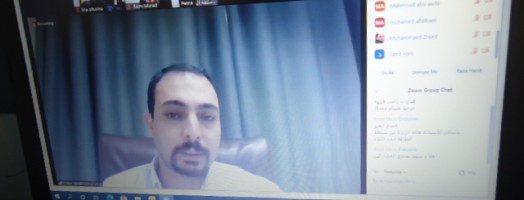Legal Framework for Regulating the Energy sector in Gaza
The Institute of Law (IOL) holds a legal encounter in Gaza on
“Legal Framework for Regulating the Energy sector in Gaza”
Gaza – On Tuesday 20th of October 2020, the Institute of Law (IoL) of Birzeit University organised a legal encounter on “Legal Framework for Regulating the Energy sector in Gaza” It was held in partnership with Konrad Adenauer Stiftung-Palestinian Territories. The lawyer, Mr. Bakr Al-Turkmani from the Independent Commission for Human Rights (ICHR) and Mrs. Hala Al-Zibdah, Assistant for Vice President of the Energy Authority (Penra), had spoken at the legal encounter.
Mr. Bakr Al-Turkmani began his speech by indicating to the present electricity crisis that the Palestinian citizen suffers from in Gaza Strip. He pointed out that there were multiple causes for this crisis. The crisis led to the presence of a private sector supplying electricity in Gaza Strip through generators for nearly five years. It was enlarged by the decisions of the official authorities in Gaza Strip regarding regulating the sector through licenses and fixed price of a kilo of electricity; And the legal procedures that were taken against generators’ owners, as a result of their rejection of these decisions. Whereas, on 9/15/2020 the Energy Authority announced a new price per kilo, which is 2.5 NIS. The Energy Authority had defended its decision regarding the pricing stating that it was based on in-depth and specialized studies. Whereas, the owners of generators believe that this price is unfair to them and it is not agreed upon by the generators’ owners, and causes a heavy loss to them. The owners of the generators were forced to sign pledges not to stop their generators and to abide by the pricing starting from 1/10/2020, otherwise they will be subject to legal accountability.
He proceeded to talk about the legislative framework regulating electric power in Gaza Strip, as he reviewed the laws in force in Gaza Strip. He pointed out that the Law No. (12) of 1995 regarding the establishment of the Palestinian Energy Authority, remains the basic legislation governing for the energy sector in Gaza, Also, the agreement concluded between the Energy Authority and the Power Plant, which is a private company, in 2003. The most recent is the decision issued by the Committee for Monitoring Governmental work, regarding granting powers to the head of the Energy Authority to regulate the generators sector, and the decision issued by the Vice President of the Energy Authority in Gaza regarding determining the electricity price for generators and the necessity of licensing.
Al-Turkmani also discussed the agreement between the Energy Authority and the Contractors Union, to implement a project to generate an electricity from the commercial electrical generators in Gaza. He pointed out the danger of this type of project, and that we are heading towards privatizing all the electricity sector, starting from the power station, the private generators, and also solar energy projects. All of them tend to exhaust the citizen economically, where it was more appropriate for the government agencies and the Energy Authority to supervise the electricity sector, which indicates to a dangerous sign for the withdrawal of the Energy Authority from its role in providing electricity, especially at the strategic level, so that the private sector becomes the main controller over the electricity in an advanced stage.
Then Mrs. Hala Al Zebdah began her speech, noting that the reason of the disruption of major projects related to energy sector in Gaza Strip is the occupation. She indicated that the Energy Authority has many strategic plans that are constantly being developed, in order to cover the existing deficit, by expanding the presence of large generating units for electricity in specific areas; in addition to obtaining the fuel at a lower price, which is gas. She indicated that the two projects are exciting and being monitored.
She also talked about the decision taken on 9/15/2020 regarding determining the electricity price for generators, and the dispute between the owners of generators and the Energy Authority carried out several studies to determine the price and issued the appropriate pricing. Mrs. Al-Zebdah added that there are solar energy projects of the Energy Authority which are under implementation for the next five years, and will be directed to schools, clinics and institutions.
At the end of the meeting, the discussion was opened, which included many interventions and recommendations. The most important is the need to increase the responsibility of the Energy Authority to provide the electricity to citizens in a low price, and the initiatives to implement public projects, which are directed to citizens, so that the electricity sector will not be fully privatized in the near future.











